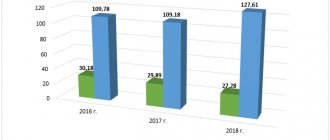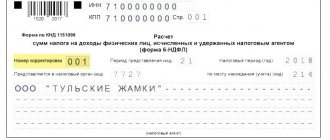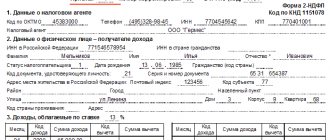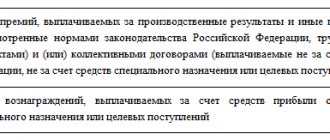In the Russian Federation, there are two categories of taxpayers - organizations with the status of tax agents and individuals. Both of them bear obligations established by the state. We are talking about paying income tax on all income they receive, except for those excluded from the category of mandatory cuts by law. Many people are interested in the question regarding personal income tax: is it a federal or regional tax?
Despite the fact that employers pay tax for their employees, a situation may arise when a citizen must do this himself. A personal visit to the tax office and payment of income tax will be required in the event of a large win or sale of real estate. Also, information about income tax will be useful for those who are planning to open their own business.
In this material we will understand what tax rates and base are, what objects are listed as taxable and find out where personal income tax is transferred - to the regional or federal budget.
Personal income tax: federal or regional tax?
Objects subject to personal income tax
According to Russian legislation, there are two main objects that are subject to personal income tax. First of all, this is the profit that a resident of Russia receives during the reporting period, regardless of where its source is located - within the country or outside it.
Another object is the profit of non-residents of the country, who, without changing, draw it from Russian sources. In addition to labor income, this includes:
- Money paid for work under an official agreement.
- Income from the sale of your property, shares in organizations, shares, and so on.
- Funds received for the exploitation of the author's rights to intellectual or other property.
- Renting out property located in Russia.
By law, you must independently declare your income:
- Persons conducting private practice (lawyers, private detectives, notaries).
- Persons who received unearned income from the sale or rental of property.
- Citizens whose income is transferred from sources outside the country.
- IP-schniks.
- People who received remuneration from a source that does not have the status of a tax agent.
- Heirs of the authors of inventions, works of science or art, receiving rewards.
- Citizens who have won money in risk-based games (lotteries).
An important point is that the annual deadline for self-declaring income is April 30th.
Income that is not subject to taxation
Despite the fact that personal income tax is imposed on any funds that fit the definition of “income,” the Tax Code of Russia includes a specific list of income that is not taxed. Whether this income is received by a resident or non-resident of the country does not matter in this case. The list of such income includes:
- Cash benefits for pregnancy and childbirth, alimony.
- Pension accruals for persons who have reached the legally established age for retirement or who have been recognized as disabled by an examination.
- Compensation for damage to employee health.
- Gifts worth less than 4,000 rubles received by an employee or former employee (pensioner) from the employer.
- Financial assistance in the amount of less than 4,000 rubles received by an employee or former employee (pensioner) from the employer.
- Financial assistance to low-income families whose status is confirmed by the state.
- Payment from the employer's net profit for medical care for its employee or his family members.
- Rewards for blood donors.
- Compensation for damage to employee health.
- Compensation for the cost of vouchers to sanatoriums and other institutions related to the health of citizens (except for tourists).
- Expenses for improving the professional qualifications of an employee.
- Payment for retraining, education or professional training of an employee.
- Scholarships received by students of higher educational institutions.
- Grants for educational or scientific activities.
- Compensation in connection with dismissal, the amount of which is not more than three times the average monthly salary (six times the amount for residents of the Far North).
- Financial assistance to the family of a deceased employee.
- Financial assistance paid to citizens affected by a natural disaster or other emergency situation.
- Funds donated to victims of terrorist attacks.
- Compensation to an employee for the cost of paying interest on a loan for construction or purchase of real estate.
Personal income tax – what is it?
Individuals receiving income (cash) are required to give up part of it in favor of the state budget at a set rate. This alienated part is considered an income tax, which is direct and basic for the entire population of Russia.
Please note that this tax is paid not only by individuals, but also by legal entities.
The calculation of the amount due for payment to the state treasury is made on the basis of two basic values:
- tax (financial) base;
- tax rate.
Let's talk about these important concepts.
Characteristics of the tax base
For each type of income (object of taxation), such a characteristic as the tax base is used. It is necessary to measure such an object, to express it quantitatively. Essentially, the tax base is the set of incomes on which direct taxes are levied. At the end of each tax period (month, three months, year or other time frame), the tax base is determined.
There is a system - tax accounting, which summarizes data to determine the tax base. Each organization in the status of a tax agent independently creates such an accounting system. This is a necessity established by law. All paying organizations are responsible for the timeliness, reliability and transparency of tax information. According to the Tax Code of the Russian Federation, there are two methods of accounting for the tax base: cash and cumulative. In the first case, actual income that has already been received is taken into account. The accumulative method takes into account not the money itself, but the rights to it. That is, if the organization has not yet received funds, but has the right to receive them, this fact will be taken as income.
According to Article 210 of the Tax Code of Russia, three forms of income of payers are included in the tax base: material, natural and monetary
In this case, for each form the financial base will be calculated separately, since each type of income has its own rates. The tax base is a value that helps in calculating the amount of income tax. To calculate it, you need to multiply the base by the tax rate.
Tax rates in the Russian Federation
The tax rate is the amount of tax assessments multiplied by the unit used to measure the tax base. This is a mandatory element and the main criterion for calculating any tax established by law.
Table 1. Tax rates in the Russian Federation
| Bid | Meaning |
| 13% | The standard 13% interest rate is levied on the income of individuals, no matter whether it is funds received as wages or money for the sale of an apartment. With the onset of 2015, this rate became valid for the payment of dividends. Please note that the financial basis for dividend deductions is determined separately from other incoming funds that are subject to tax at the standard rate. |
| 9% | 9% is taken from money received in the form of pre-2007 mortgage bonds. The same rate is valid for funds received by the founders of the union managing the mortgage coverage, which were acquired as a result of the purchase of mortgage participation certificates made before 2007. |
| 15% | Non-residents of the Russian Federation, who are individuals who have shares in companies located and operating in Russia, and therefore receive funds here, are subject to a rate of 15% of the amount of income received. |
| 30% | Other income of non-residents not included in the previous paragraph is taxed at 30%. |
| 35% | 35% is withdrawn from cash winnings received by citizens for participating in any kind of event, as well as from the percentage of the bank deposit made. |
By whom and how is personal income tax transferred to the budget?
According to the Tax Code of our country, income tax payers are citizens who receive funds from a source located on the territory of the Russian Federation. However, they can belong to two different categories:
Tax Code of the Russian Federation Article 207. Taxpayers
A resident is a resident of our country who has a passport of a Russian citizen and permanent registration on the territory of the Russian Federation. At the same time, a resident receives or maintains his status by living in the country for at least 183 days a year. For residents of the Russian Federation, the so-called general rate applies to personal income tax, which is relevant at a given time. This year it is 13% of the income received.
Let's give an example: if a citizen, for example, has a monthly salary of 10 thousand rubles before deducting personal income tax, then he will receive 13% (that is, 1 thousand 300 rubles) less. It turns out that in the end there will be 10,000-1,300 = 8,700 rubles left for his expenses.
The most significant difference between the status of resident and non-resident is that representatives of each category pay completely different amounts to the state treasury from the income they receive in Russia
Based on the definition of a resident, one can easily say who he is – a non-resident. In fact, this is a person who left his homeland too often, and as a result did not accumulate 183 days of stay on its territory. The main difference between these two statuses in practice will be reflected in the amount of personal income tax paid.
If a person, due to a long and frequent absence from the territory of Russia, is recognized as a non-resident, then in this case the amount of income tax for him will be completely different.
Thus, the rate relevant for non-residents is 30% of income. Therefore, if our hero receives the same salary of 10 thousand rubles, even then after income tax he will have 30% (that is, 3 thousand rubles) less. Consequently, he will be able to manage the following amount: 10,000-3,000 = 7 thousand rubles.
Agree, the difference is quite noticeable. At the same time, in our example we consider an initially small amount of income. In those situations where this indicator is large, the citizen will have to give a much larger amount of money to the state treasury.
This tax must be paid only to those citizens who are employees of organizations located on the territory of our country, or who receive income from other sources also located on its territory.
Regardless of who the citizen is (non-resident or resident), in order for tax to be collected from him, it is necessary to have a source of incoming income on the territory of the Russian Federation.
Taxpayers can transfer tax revenue to the country’s treasury in various ways:
- in fact, without taking part in the process, through an intermediary - a tax agent, who is appointed by the employer organization of the individual;
- or independently, if the citizen receives funds systematically or one-time.
We correctly calculate the amount of personal income tax
To avoid imposing a fine for an incorrectly paid amount, it is worth figuring out how to calculate personal income tax. Some will say that the employer does this for most citizens, but at any time you may need to declare income on your own - when you receive winnings, money from the sale or rental of property.
Any payer can calculate the amount of tax
The first step is to quantify the income subject to tax. Next, find out the tax rate for each type of income and calculate the tax base. It was already mentioned above that depending on the type of income, a specific rate is applied, and each rate has its own financial base. The last step, when the named quantities are known, is simple calculations. You need to use the formula specified in the Tax Code of the Russian Federation: multiply the tax base by the tax rate, as a result the total amount of personal income tax will be determined.
What budget does personal income tax go to?
Firstly, according to the Russian Tax Code in Article 13, personal income tax refers to federal payments, does this mean that it is paid to the federal budget? Each tax, and personal income tax, has strict details for being credited to the budget system - to the accounts of the Federal Treasury of Russia. At the same time, payers transfer funds according to the payment details of their inspection and according to a single BCC - it is common throughout the country.
Details of your inspection can be found through the service:
- You need to go to the page class=”aligncenter” width=”1016″ height=”560″[/img]
- The search takes place at your address.
- You can also search by Federal Tax Service number.
- Here is an example of payment details.
All BCCs are in the Federal Tax Service directory.
Please note that there are separate codes for tax, penalties, fines, etc.
Next, you need to rely on the Budget Code of Russia - it establishes to which budget, federal, regional or local, personal income tax is paid by citizens and transferred by employers:
- Article 56 of the Budget Code of the Russian Federation lists tax revenues of regional budgets - 85% of the personal income tax goes to the regional budget according to revenues in this subject of the country;
- Article 61 of the Budget Code of the Russian Federation states that the remaining % of personal income tax is paid to the local budget according to fees in rural and urban settlements, municipal and internal urban areas and urban districts.
To make sure that there are no income tax receipts in the federal treasury, you can look at Article 50 of the Budget Code of the Russian Federation - personal income tax is not included in the list of tax revenues. Regions and local self-education bodies adopt their own budget laws and distribute personal income tax collections depending on the needs of the territory.
You can view the specific amounts of tax revenue through the Federal Tax Service website - in the statistics and analytics section.
You have access to data up to 2006 inclusive.
- Personal income tax is a federal payment, i.e. the entire list of its elements is established by the Tax Code of Russia.
- According to the Budget Code of Russia, 85% of income tax goes to the budgets of the constituent entities of Russia.
- The rest of the personal income tax goes to the local treasury.
Money calculated and withheld
An employee's income tax goes through two stages before ending up in the government treasury. Every month, at the end of the reporting period, the accounting department accrues personal income tax. The funds will be transferred to the budget later, at the time the employees actually receive their wages. It turns out that in the first order the tax agent calculates (withholds) the amount allocated for the transfer, and in the second order he performs the calculation itself. In the accounting department of any company, settlement journals are kept, and each transaction has its own. They include information about the employee: his income, rates, accrued and withheld amounts.
The fact of the impossibility of transferring tax funds due to insurmountable reasons is also described in law. If a tax agent company finds itself in this situation, it is obliged to submit to the inspectorate the appropriate papers documenting what is happening as soon as possible.
Distribution of income tax between budgets
Last update 2019-06-12 at 10:29
Income tax is levied on all citizens who earn income in Russia, and even foreigners cannot avoid this payment if they make a profit within the country. The massive scale of the income tax and the wave of revelations in government agencies make us think - to which budget is the income tax credited and how is the personal income tax distributed in the financial policy of the state? Read about the distribution of personal income tax between budgets in 2021 in our material.
Personal income tax: document for reporting
Individual entrepreneurs and large companies that are legal entities still hire employees. This means that they are tax agents and must submit to the tax office the necessary documents, which indicate the labor taxes calculated and actually transferred to the state treasury. In this case, the main document is a certificate called 2-NDFL, which provides information on whether the tax agent has fully fulfilled its obligations to the Russian Federation.
Such a certificate in the accounting department is filled out for each employee separately; the basis for the specified data will be the fact that the employee receives wages or other income from the employer.
Important point! Each tax rate requires the completion of its own 2-NDFL certificate. If an employee receives a salary subject to 13% tax, and he also received money from the sale of a car, form 2-NDFL is filled out twice for him, each certificate reflects its own type of income and its taxation. In the example we indicated, the first certificate, about salary, will be prepared by the employer, the second, about personal income, will be prepared by the payer himself. The document must be prepared in two copies and submitted to the tax office for consideration no later than April 1 (at the end of the reporting period of the year). An example of filling out form 2-NDFL can be found in our article.
What happens if you don’t pay personal income tax?
The Russian Tax Code clearly establishes sanctions that will be applied to both the tax agent and the individual in the event that personal income tax is paid late or the transfer of funds to the state treasury is completely ignored.
Timely payment of taxes is controlled by law
Thus, tax agents who delay in transferring funds may receive a fine of 20% of the tax amount itself. The state will “charge” the same interest on top if the money is not transferred at all or the calculation is incomplete. Also, arrears and penalties may be withheld from the defaulter. But there is a nuance - if labor income is paid to employees in kind, it is impossible to collect taxes from them, and delay in tax payment, accordingly, cannot happen either. Another point is that the tax agent did not withhold personal income tax from the employees’ income. In this case, he will also face a fine, but without a penalty.
As for individuals, they may also receive a fine of 20% of the tax amount in case of incomplete payment or non-payment. But the law provides for another penalty for deliberate underestimation of taxable income. If an individual specifically indicates a smaller amount in the declaration, he will be subject to a fine of 40% of the actual amount. The law also exempts individuals from fines in case of late payment. But penalties for personal income tax for late payment will be charged.
Didn't manage to submit your declaration on time? Do you want to know what the consequences are for failure to submit reports on time? Read more about the statute of limitations for tax offenses and how to reduce the amount of the fine in our article.
Personal income tax: which budget is credited to, who makes the deductions
One of the main tax fees levied on citizens of our country is personal income tax. In what budget this payment from the pocket of each Russian is credited is of interest to many, since all of us, of course, would like to see what favorable changes the money spent will contribute to. In addition, which budget to send personal income tax to is a predetermining question for each employing organization that withholds tax from its employees, and other organizations that need to independently pay tax on the income they receive.
Personal income tax: which budget is it included in?
Budget for personal income tax: regional or federal?
Income tax is a very significant fee for any country, not only Russia. Due to these payments, the state treasury receives very significant cash injections, which can be compared with revenues from income taxes or VAT. Let’s figure out what level the personal income tax in Russia should be assigned to.
The tax system of our country involves three types of taxes: federal, regional and local. Which classification the tax will be assigned to depends on the level of the government agency introducing mandatory payments. According to Article No. 23 of the Tax Code of the Russian Federation, the tax on labor income is federal. The principle of this classification is based on the fact that personal income tax is a fixed tax, the payment of which is carried out in the same and unchanged way in all settlements of the country without exception. This is the difference between taxes classified as federal and regional. The latter are legislatively prescribed very imprecisely, and local authorities can establish specific features and nuances of such payments, based not only on federal laws, but even on their own regulations.
However, personal income tax does not go entirely to the federal budget. According to the law, only 85% of the total tax funds paid goes to the budget of Russian constituent entities. An exception is made for taxes paid by foreigners who work in Russia under a patent - in this case, the money is credited to the subject budget 100%.
The remaining 15%, according to the Budget Code of Russia, must be credited to local budgets; then they will be distributed depending on the administrative structure of this subject. So, if the subjects have rural settlements divided into municipal districts, the former will receive two percent of the amount, the latter – thirteen percent. If the territory of the subject includes urban settlements, then ten percent of personal income tax will be transferred to their budget, the municipal districts within them will receive the remaining five percent.
Separate divisions and personal income tax
Separate divisions, allocated to a separate balance sheet, are authorized to independently calculate and pay wages. In what budget is personal income tax credited to such structural units? To the federal one. The tax is paid at the place of registration of the “isolation”. If the division does not have its own balance sheet, then the tax for its employees is also subject to payment according to the details of the inspectorate in which the division is registered.
That is, the tax is paid based on the location of the structural unit (Clause 7, Article 226 of the Tax Code of the Russian Federation). The rule applies to both domestic enterprises and foreign companies that have separate divisions on the territory of the Russian Federation.
The presence of income paid to individuals is the basis for withholding and paying tax to the budget. Where does personal income tax go? For the needs of the constituent entities of the Russian Federation and to improve the social situation in municipalities. Income tax belongs to the federal group. It is subject to transfer in a single payment, which at the next stage is divided by the treasury for redistribution between budgets of different levels.
Payment “to addresses” and federal payments
There is no connection between the registration address of individuals and the transfer of personal income tax withheld from wages. However, most often the employer makes the payment based on the territorial affiliation of the company where the employee is employed.
Example. Individual entrepreneurs conducting two or more areas of activity, in one of them will report to the tax office at the place of their registration, in another - to a third-party inspectorate, according to the geolocation where the business is actually carried out. Then the personal income tax for employees will be distributed between different tax inspectorates if the employees are employed in different areas.
Is personal income tax counted towards other taxes?
We found out that income tax is federal. In this regard, the following questions may arise:
- Is it possible to cover the arrears associated with personal income tax by overpaying another tax, also federal?
- Is it possible to offset the excess of the transferred personal income tax (overpayment) into other missing payments?
If we consider organizations that have the status of tax agents (including individual entrepreneurs), the answers to both questions are negative. We are talking about specific labor income of employees, and personal income tax should be withheld from them. Even if within two to three months the employer makes overpayments or underpayments related to the same person, the tax agent may face fines. The law in this case is adamant - tax is withheld directly when specific money is paid to a specific person.
The above issues are simpler for an individual entrepreneur who pays income tax for himself. Individual entrepreneurs working under the general taxation system also pay VAT (this is also a federal tax), therefore, when submitting a corresponding application to the tax office at their place of residence, they will have the opportunity to make recalculations between these taxes. Such a scheme will help individual entrepreneurs recover overpayments.
Video - Regional and local taxes
Where do wage taxes go and where to pay personal income tax for employees and other obligations?
Most of the income tax revenues replenish the budgets of the constituent entities of the Russian Federation, the remaining share relates to the income of local budgets (Articles 56 and 61 of the Budget Code of the Russian Federation).
Income tax is paid in a single payment according to the relevant BCC. Further, the Treasury, on the basis of OKTMO, independently sends the amounts of deductions to the appropriate budgets.
KBK for personal income tax payment in 2021:
- 18210102010011000110 - personal income tax on income paid by the tax agent.
- 18210102020011000110 - Personal income tax on income of individual entrepreneurs, notaries, lawyers.
- 18210102030011000110 - Personal income tax on income of persons received under Art. 228 Tax Code of the Russian Federation.
- 18210102040011000110 - Personal income tax of foreign individuals using a patent in their work activities.
About the BCC used when paying other taxes, read the material “Deciphering the BCC in 2021 - 18210102010011000110, etc.”







